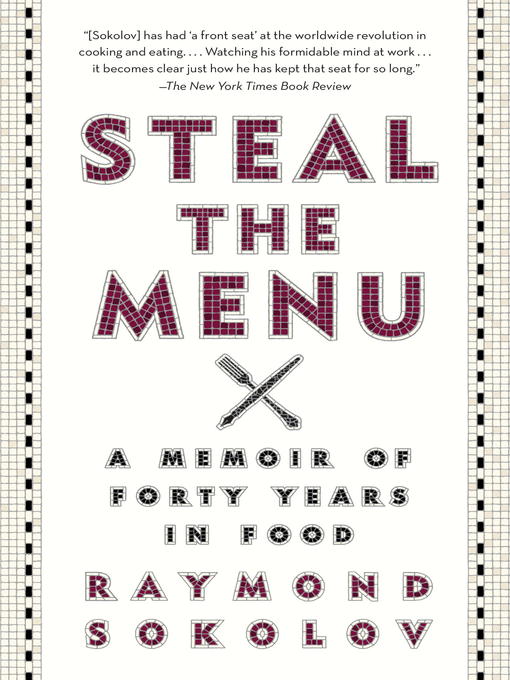
Steal the Menu
A Memoir of Forty Years in Food
کتاب های مرتبط
- اطلاعات
- نقد و بررسی
- دیدگاه کاربران
نقد و بررسی

Starred review from April 1, 2013
Sokolov invites readers to join him around the table and to share the many repasts he’s consumed, skewered, and roasted over the past 40 years as a food critic in this delightful remembrance of meals past. In 1971, Sokolov joins the New York Times as its chief food critic, succeeding the popular Craig Claiborne. Although a bit cowed by this new assignment, he embraces it with gusto, recalling his the ways that his earlier experiences with food and eating have prepared him for this moment. In the summer of 1960, eating his way across Europe, Sokolov says he “acquires a huge new vocabulary of dishes—andouillette, marcassin, cou d’oie farci aux lentilles—I tasted every one of those dishes with gusto and could still give you a vivid account of the flavors and textures in many of them.” Such experience gives him the confidence, the vocabulary, and the judgment that stays with him over the course of his career as a food critic. In his Times reviews, Sokolov famously knocks the until-then well-regarded French restaurant Le Grenouille off its pedestal, calling it on the cutting board for its “canned-tasting peas and clams in white wine too humdrum for a top restaurant.” At the same time, he elevates the status of Lutèce, which “feels like a real French restaurant with topflight dishes you might find in France.” Captivating and humorous, Sokolov’s inviting memoir joins the ranks of Ruth Reichl’s and Judith Jones’s elegant recollections of a life lived at table.

March 1, 2013
A knowledgeable look at the transformation of fine dining over the past half-century, viewed through the prism of the author's personal history. When Sokolov succeeded Craig Claiborne as food editor of the New York Times in 1971, he was unimpressed by the city's ossified restaurant scene. Bolstered by "the ego of a child prodigy" (he was a National Spelling Bee contestant at age 10), Sokolov dismissed the fare at Manhattan's established French restaurants as mediocre imitations of the authentic French cuisine he had savored while a Newsweek correspondent in Paris. Management rather liked the stir Sokolov made with his glowing review of a humble Sichuan restaurant attached to a New Jersey gas station; they were less enthusiastic about a survey of dog foods that Sokolov acknowledges sardonically spoofed his regular gig, nor did they appreciate the generally "anti-establishment and rhetorically flamboyant" tone of his work. Sokolov was fired in 1973, less than a year after his prescient Times column embracing the nouvelle cuisine revolution being fomented in France by Paul Bocuse, Michel Guerard and the other Young Turks. In his fuller assessment here, Sokolov disdains the marketing of nouvelle cuisine as "the cuisine of modern, slim people," arguing that its true significance was as "a most elaborate system of culinary parody, punning and metaphor." Readers unconvinced by this provocative claim may nonetheless enjoy the author's braininess and brashness as he goes on to chronicle a freelance career that included a highly intellectual food column for Natural History magazine before he settled down for 19 years as editor of the daily arts page for the Wall Street Journal. Sokolov is equally stimulating on the "molecular gastronomy" of Ferran Adria and other modernist chefs. Perhaps a bit too acidic for some tastes, but most foodies will find the book refreshingly different.
COPYRIGHT(2013) Kirkus Reviews, ALL RIGHTS RESERVED.

April 15, 2013
Sokolov has reported on the world of food and restaurants for the New York Times and the Wall Street Journal. Trained as a scholar of ancient Greek at Harvard, he became a journalist in Paris just at the outset of the great revolution in French cuisine inaugurated by Fernand Point and his disciples. Sokolov succeeded the redoubtable Craig Claiborne at the Times only to find Claiborne an impossible act to follow. His take on the rise of real Chinese cooking in New York earned him no little enmity, and the stresses of restaurant criticism exacted a huge personal toll. He embarked on a freelance writing career and produced one of the great books on the history and making of classic French sauces. Sokolov's life comes full circle as the Detroit boy discovers in the evening of his career that some of America's best cooking now appears in innovative, new midwestern restaurants.(Reprinted with permission of Booklist, copyright 2013, American Library Association.)

























دیدگاه کاربران